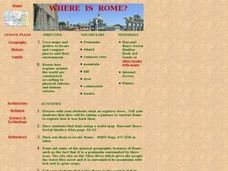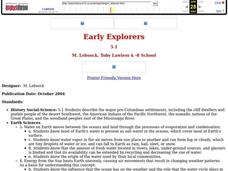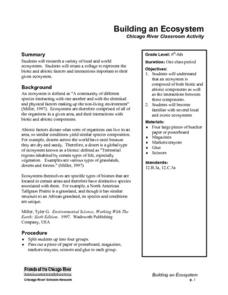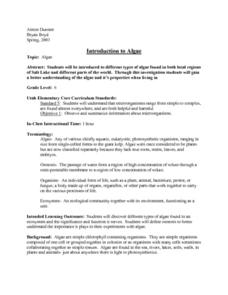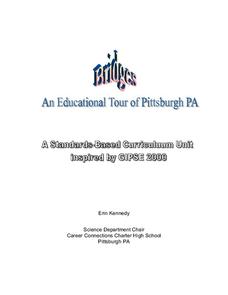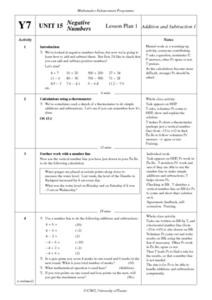Curated OER
Where Is Rome?
Third graders discover Ancient Rome through maps and worksheets. In this world history lesson plan, 3rd graders locate Rome on a world map and identify the scope of the Roman Empire. Students label an entire map of Italy...
Curated OER
Where the Spirit Moves You
Students explore the spiritual significance of locations throughout the world. After studying the historical and mystical importance of these places, students write about a spiritual place that is special to them.
Curated OER
American Literature - The American Dream: Past, Present, and Future
Students are introduced to the ideas of the American Dream at the turn of the century. They present their ideas on the American Dream at the turn of the century through a person characterized in Edgar Lee Masters' Spoon River Anthology.
Curated OER
A Powerpoint Presentation On Sustainability
Students are introduced to the important geography concept of sustainability by looking at the Roseau River floods of 2002. They discuss the impact of humans on the environment. They explain how sustainability relates to everyday geography.
Curated OER
Floodplain Modeling
Learners simulate the impact of fluctuating river volumes on structures and landforms. They experiment with table top-sized riverbed models and water. Students consider how human design can help mitigate the effects of a flood.
Curated OER
Living and Nonliving
Students use their senses to record and collect data. In How Do I Classify Things in My World?, students practice classifying objects as living or nonliving. In Is it Real Or Pretend?, students group objects as real or pretend. In What...
Curated OER
Motivating Activities for Geography Week
Here is a great way to pique your students' interest in geography, and help them learn about their world.
Curated OER
Geography: Water, Water Everywhere
Students discuss flooding and its causes. They view a Powerpoint presentation about floods and prevention methods. After creating a model with clay and pans, they investigate river behavior in various terrains with different amounts of...
Curated OER
Early Explorers
Fifth graders study early explorers. In this World history lesson, 5th graders draw an outline of a map labeling each part, build geographical features out of dough, and paint each of the land and water features.
Curated OER
Building an Ecosystem
Young scholars research a variety of local and world ecosystems. Students will create a collage to represent the biotic and abiotic factors and interactions important to their given ecosystem.Young scholars will understand that an...
Curated OER
Importance of Rice
Third graders explore the importance of rice in our world. In this rice farming instructional activity, 3rd graders discover how much rice we use on a daily basis. Students also discover myths from other cultures about rice. Students...
Curated OER
Water Works Wonders
Students examine where water is found in the world, how we use it, and the various forms it takes. They observe the refraction of light through a prism, record the day and night sky over a week's time, and create a topographic model of...
Curated OER
Introduction to Algae
Students explore different types of algae found in both local regions of Salt Lake and different parts of the world. They discover different types of algae found in an ecosystem and the significance and function it serves.
Curated OER
Chart Your Course
Young scholars explore change represented in graphs comparing distance and time. They exchange and share their graphs. Students interpret and create distance versus time line-graphs, and write stories based on these graphs. They...
Curated OER
Seeing Things From the Someone Else's Point of View
Students examine the cultural trait of sharing, trying to view it from the point of view of someone in another culture. They question what we gain from trying to see the world from the perspective of another person or culture and...
Curated OER
What Sharing Really Means
Students read the story "Sharing in Africa". As a class, they brainstorm a list of holidays and celebrations in various cultures and identify the Congo on a world map. To end the lesson, they focus on one paragraph of the story,...
Curated OER
Bridges
High schoolers are introduced to the different types, designs and nature of bridges. They observe a historical look at the bridges in and around the Pittsburgh area through a video presentation. Connections are made between science and...
Curated OER
Elements of Civilization
Students create their own ancient civilizations based off of topographical maps of Egypt, Mesopotamia, the Indus Valley, and the Yellow River. In this social studies lesson, students are assigned one topographical map to use to create...
Curated OER
Jinga All the Way
Young scholars study African history and the life of one of its most successful warriors, Queen Jinga. They write a diary as if they were Queen Jinga and examine other important women in history from around the world.
Curated OER
Counting on Cooperatives
Students are introduced to the study of economics, including an introduction to basic business types and systems. They investigate about international, national and California history as they take a historical tour of cooperatives and...
Curated OER
Too Cool for School-The Greenhouse Experiment
Students create a town model and analyze the type of greenhouse gases their town emits. In this earth science lesson, students build greenhouses to investigate how trapped heat causes temperature change. They relate this activity to...
Curated OER
The Color of Soil
Students are introduced to the Munsell System of Color Notation that is used for direct comparison of soils anywhere in the world. They become familiar with hue, value and chroma notations, identify colors that act as clues to the...
Curated OER
Somewhere in the World . . . .
Students, in groups, choose a country. On the surface of an inflated balloon, they draw/write information (geographic and otherwise) about the country. To finish the project, they make a basket for the balloon and then give a 2-3...
Curated OER
Negative Numbers
Sixth and seventh graders investigate the concept of negative numbers. The instructional activity begins with a review of positive numbers and progresses to the various operations with negative numbers. The instructional activity...


